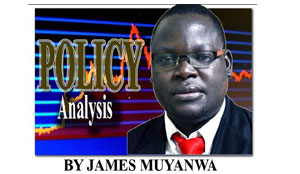 AS Zambia enters a new era following the election of Edgar Lungu as the Sixth Republican President there is need to refocus and reenergise some of the development activities.
AS Zambia enters a new era following the election of Edgar Lungu as the Sixth Republican President there is need to refocus and reenergise some of the development activities.
During the campaigns, as I said then, a lot of issues came up from the presidential candidates including the eventual winner, Mr Lungu.
Generally, some of these proposals were splendid while others were unrealistic – at their best – and therefore, could be dismissed as mere campaign promises.
These, however, are not the subject of today’s article but a sheer recap to remind those who care to follow backgrounds.
While President Lungu was being sworn in during that well-organised ceremony, however, some disjointed thoughts were going through my mind.
Later on I chose to separate the -economic-related issues from others and galvanised them into a somewhat logic text.
The first thought that lingered in my mind was national development planning and initially I could not tell where it was pointing me to.
In my view there is need to reintroduce the component of the national development planning to the current ministry of Finance.
I am aware that, that section could still be an integral part of the ministry but given the importance of the development planning, it should stand out even in the name of the ministry.
This will ensure that other officers in the systems do not overlook it and those in the wing distinctively coordinate the development planning functions.
I know that there has been a lot of advocacy for a lean government but given the importance of planning it should possibly, be headed by a deputy minister who, of course, will be reporting to Mr Alexander Chikwanda who has bounced back as minister.
Given the imperative need for decent jobs in the country, to beat the current high level of unemployment, the Government should step up the industrialisation efforts.
The abstract thought on this was Industrialisation/clusters/MFEZs.
In stepping up the industrialisation drive, the Government should continue emphasising on the current industrial clusters and Multi-facility Economic Zones (MFEZs) as a sure way of creating decent and sustainable jobs.
Apart from job creation the effort should also culminate into the enhanced capacity by the local manufacturing sector to add value to various locally-accessed raw materials like fruits, crops, livestock, plants and other natural resources.
Closely connected to that is the idea of district milling plants to be set up in strategic districts where such crops like maize are grown.
This, notably, was among Mr Lungu’s campaign items, particularly on the need to make the prices of mealie meal cheaper.
Other benefits from the project include the provision of ready market for the crops in those districts where the milling plants will be located.
This will cut a lot of costs away from the final cost of production in that there will be no transport, no extra storage costs and others which are current involved in the movement of the maize and mealie meal back and forth.
This thought triggered another, the need to revive the current cooperative movement in the country to the status of its heydays.
This is because already the Zambia Cooperative Federation (ZCF) has embarked on a project to implement the milling plant idea.
The ZCF has already secured US$10.8 million from the Development Bank of Zambia (DBZ) for the construction of four milling plants in four districts.
The milling plants once completed are expected to create at least 1,000 jobs.
The DBZ would provide US$10.8 million out of the US$55 million budgeted for the establishment of the 25 milling plants in the rural areas.
But why did the thought of oil procurement/price continue haunting me?
I reckon it is because of the need to have a clear way of importing that source of energy.
For instance, at the moment I am not sure whether Zambia is importing the crude oil or the finished products or both?
It is common knowledge that even if Zambia is a landlocked country it could much more effectively benefit from the current falling prices of oil if it imports the crude oil.
If, however, the Government is importing the finished petroleum products there is need to address the cause of that and quickly revert to the importation of the comingled oil to yield maximum benefit from the low prices of the bulky oil.
This coupled with the much-talked-about removal of the many middle people involved in the oil procurement should be able to maintain low pump prices for the petroleum products.
Another thought which “refused” to go while as I was watching President Lungu’s swearing in ceremony was maize marketing.
I tried to brush it aside but was adamant and continued to haunt me till the end of the ceremony and then I said why?
As Mr Lungu embarks on his presidency, this should be one of the thorns in his Government’s flesh mainly because of the awkwardness it had placed on everyone when the farmers could not be paid on time during the last marketing season.
The thought for the need to completely change that in the coming marketing season will continue to exercise the minds of the leaders in Government starting with President Lungu.
While the Government may not provide the complete market for the crop, it should facilitate that to ensure at the end of it all, all the farmers would be happy for having participated in the cultivation of the crop.
For comments call: 0977 246099, 0955 431442 or e-mail: jmuyanwa@gmail.com .






